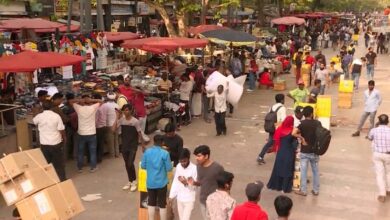In a solidarity meeting in Cairo, the Tanta Flax and Oil Company workers renewed their call for the nationalization of their factory, threatening to take over the factory and run it independently from the investor and the government if the latter didn’t intervene on behalf of the strikers.
“The strike enters its 41st day and the government has neither moved nor intervened to help us,” Ashraf el-Harti, a worker who’s sacked a year ago for taking part in a previous strike, told Al-Masry Al-Youm English Edition on Friday during a mass meeting held in downtown Cairo’s Tagammu Party Head Quarters, in solidarity with the strikers. His colleague, Abdel Aziz Fathi, a telephone operator in the company which was privatized four years ago to a Saudi investor stressed: “Our first demand now is the return of the company to the Public Sector ownership. Forget about anything else. We don’t want anything except this now.”
But other strike leaders are even more ambitious. “I want to tell the government of Egypt something,” thundered Hisham el-Okal, a sacked trade unionist who’s among the strike organizers. “You had more than 40 days to solve our problems, but you didn’t do anything. Ok, why don’t you lift your hands now off the issue and leave it for us to solve? We neither want the government nor the Saudi investor. We will take over the factory and self manage it.” El-Okal’s proposal drew standing ovation from the audience.
Representatives of the strikers took turns to address hundreds of workers and solidarity activists who packed the meeting hall, decorated by banners denouncing the Saudi investor and privatization. Their speeches were usually interrupted by strikers’ chanting against “greedy capitalism, privatization and the looting of the country by investors.”
The Tanta strike reasons go beyond the nationalization issue. Around 1000 workers have been staging a strike in the Nile Delta textile plant, since 31 May, demanding the reinstatement of nine sacked workers–including two trade unionists–and increasing the food allowance as well as receiving overdue bonuses and incentives.
“If the investor was Egyptian,” shouted one of the strikers during the meeting, “do you think they’d have allowed him to do so?” The striker then went on a frenzy, chanting: “No Saudi, No Japanese. Tanta Flax Company is returning to Egyptian ownership.”
Gamal Othman, one of the strikers’ spokespersons, also warned that workers’ patience was running out. “My advise to the government is to leave us to act if the Labor Ministry officials are not planning to intervene on our behalf. Do not blame us for what will happen. We stayed civil for 41 days and our voices were not heard. It seems we have to do another Mahalla to get the government’s attention,” he said referring to the food riots that rocked the neighboring Nile Delta province last year.
El-Okal, the sacked trade unionist, passionately spoke about what he described as the bigger picture. “If we manage to succeed in Tanta Flax, this will be the end of privatization in Egypt. All companies will follow suit and strike to be renationalized or self managed. Our fight is not only a fight for the workers of Tanta, but all of Egypt.”
Member of parliament Mohamed Abdel Aziz Shaaban attended the public meeting, and spoke in support of the strikers, denouncing the “Saudi slave labor system the investor wants to apply in Tanta.” The MP repeatedly denounced “Saudi Wahabbism and Gulf Arabs who enslave Egyptian workers,” only to be interrupted by one of the strikers from the floor: “But the management is Egyptian! A Saudi owns the company, but he uses Egyptians to run it. Egyptians are enslaving Egyptians. The management is the enemy.”
The Tanta strike is part of a series of industrial action recently witnessed in privatized firms. Though nationalization is increasingly becoming a popular demand by strikers, self-management was rarely put on the agenda. Only two companies are self-managed by the workers in the 10th of Ramadan City. Workers took over production in textile dyes and electric bulbs manufacturing firms around four years ago after the owning businessmen fled abroad to escape their bank debts.
And while the strike continues, a court is expected to look into complaints by the nine sacked workers on 17 September. Attempts by Al-Masry Al-Youm English Edition to get a comment from the company’s management failed, as managers had evacuated the factory from the start of the strike and left behind only security personnel, and police agents.




